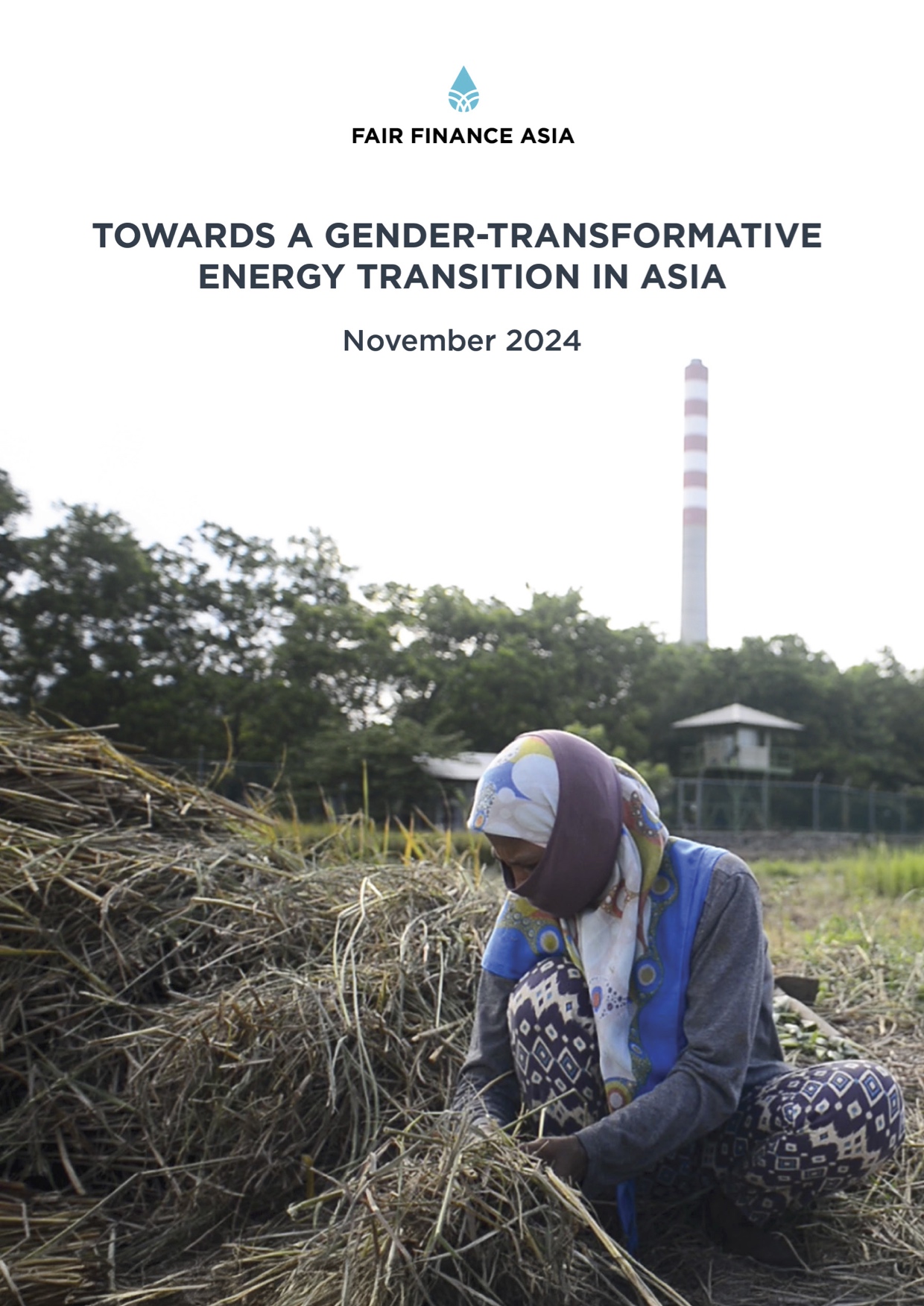
Fair Finance Asia (2024, November). Towards a Gender-Transformative Energy Transition in Asia.
On November 27, 2024, Fair Finance Asia (FFA) launched a new report, Towards a Gender-Transformative Energy Transition in Asia, which reveals critical gaps in the consideration of gender equality and women’s empowerment in the early retirement of Cirebon 1 coal-fired power plant (CFPP) in Indonesia. The early retirement of Cirebon 1 is the first transaction under the Asian Development Bank’s Energy Transition Mechanism (ADB ETM).
Endorsed by Climate Action Network Southeast Asia (CANSEA), Global Alliance for Incinerator Alternatives (GAIA), Reclaim Finance, Recourse, Reality of Aid Asia-Pacific (RoA-AP), and Fair Finance International (FFI), FFA’s assessment considers Cirebon 1 an important case study for how the ADB’s ETM model identifies and assesses gender issues, and whether the ETM promotes gender equality and women’s empowerment. FFA urges the ADB to address the critical gaps in the gender considerations of the ADB’s ETM pilot in Cirebon 1, as a basis for improving the ETM’s implementation in other pilot countries.
Based on FFA’s assessment of the Preliminary Just Transition Assessment (PJTA) summary report associated with the early retirement of Cirebon 1, FFA, partners, and allies demand more gender-disaggregated data collection, assessment, and inclusive and meaningful participation of women, other marginalized groups, and local women’s rights organizations (WROs), consistent with commitments. Future data collection and assessments should consider the gendered impacts of the ADB’s ETM pilot in Cirebon 1 on health, land rights and land-based livelihoods, unpaid care work, gender-based violence (GBV), energy access, changes to gendered power dynamics in households and communities, employment, and decent work. The ADB’s just transition plan should be guided by a commitment to advancing gender equality and women’s empowerment through the design and delivery of gender-transformative interventions.
Moreover, given that the ADB’s Strategic Environmental and Social Assessment’s (SESA) scoping report pilot did a poor job of systematically identifying gender issues and involved limited participation from WROs, a stand-alone participatory gender impact assessment would be more useful to assess gender risks and opportunities arising from the energy transition and implementation of the ETM at the country level, and to make recommendations for gender equality and women’s empowerment.
The ETM aims to incentivize the early retirement of CFPPs. For Cirebon 1, this means bringing its closure forward to 2035. The process is long and analysis and planning are still at an early stage. This means there is only limited documentation available and not all documents are available in full. This presents challenges to understanding the full extent to which risks and opportunities for gender equality and women’s empowerment have been identified. This long-time frame also presents challenges to holding the ADB, Cirebon Electric Power (CEP), and the Government of Indonesia accountable for commitments made to date.
To strengthen the implementation of the ADB’s ETM in Indonesia’s Cirebon 1 and other pilot countries so that it promotes gender equality and women’s empowerment, the report makes the following recommendations, among others, to the ADB:
For Indonesia and the Cirebon 1 transaction:
- Supplement the SESA of the ETM in Indonesia with a gender impact assessment. It should be translated in local languages, published in full, and involve the active and meaningful participation of women and WROs during the preparation and implementation. The gender impact assessment should be based on gender-disaggregated data that includes clear information on employment and decent work, health, land rights and land-based livelihoods (as well as water rights and water-based livelihoods such as fisheries), unpaid care work, GBV, and energy access.
- Publish the full PJTA and supporting analyses for Cirebon 1 and ensure relevant translations into local languages to make it accessible.
- The just transition plan for the CFPP should be guided by a commitment to contributing to gender equality and women’s empowerment, including through the design and delivery of gender-transformative projects and programs.
Other countries’ ETMs:
- All assessments of the potential risks and opportunities of the ETM for women and men should be equitably based on:
- The collection and analysis of gender-disaggregated data.
- A stand-alone gender impact assessment (in addition to tools such as SESA and a just transition assessment).
- The inclusive, active, meaningful, and continuous participation of women and WROs as well as relevant civil society organizations (CSOs).
- Just transition planning should be guided by a commitment to contribute to gender equality and women’s empowerment, including through the design and delivery of gender-transformative projects and programs.
General recommendations:
- Strengthen gender safeguards in the approved Environmental and Social Framework (ESF), including to reframe women’s role as active participants within the framework of a gender action plan rather than the protectionist attitude of avoiding and protecting their rights.
- Develop and implement a more effective, gender responsive grievance mechanism that delivers remedy and redress to affected people, including women, men, girls, boys, Lesbian, Gay, Bisexual, Transgender, Queer, Intersex, and Asexual (LGBTQIA+), and non-binary people.
- Improve the environmental and social compliance audits by strengthening gender considerations in the processes, including with regards to the ETM.
FFA suggests for these recommendations to be implemented alongside initiatives to strengthen energy democracy through small-scale, locally owned, and gender-representative energy systems; to address barriers to women’s labor force participation; and to emphasize a rights-based approach and gender-based needs for ecosystem resilience.
FFA’s report considers documents published before 25 November 2024 and acknowledges that additional assessments will be undertaken and published by the ADB. The conclusions reached in FFA’s report could, therefore, change based on information published in the future.
To read the full report, click here.
To read the launch announcement, click here.